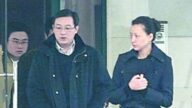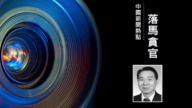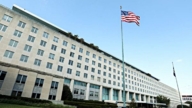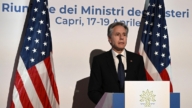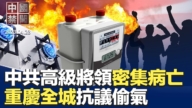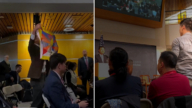【新唐人2014年08月29日讯】中共国务院以现行的“国家安全法”为基础,拟定了“反间谍法草案”,25号已经提交人大审议。当局说,这是为了进一步加强反间谍。在当今中国社会里,什么样的人会被定义成“间谍”?当局真正担心的,是国家的安全?还是党的安全?中国法律界人士,还有曾经被当作“美国特务”对待的民间人士,对此都自有解读。
现行的“国家安全法”从1993年2月开始实行,在总则中就明确提出,是为了保卫中共政权和所谓社会主义制度。
而目前中共人大常委正在审议的“反间谍法”,是国安部在现行“国家安全法”的基础上起草的。中共国安部部长耿惠昌表示,提出“反间谍法”是为了适应所谓国家安全面临的新形势、新任务,而进一步“规范和加强”反间谍工作。
大陆维权律师唐吉田:“什么是‘国家安全’?民主国家的‘国家安全’和民众的利益紧密联系的,但是中国大陆的所谓的‘国家安全’,其实跟普通人没有什么关系,主要是和掌握国家政权的统治集团有关的。所以‘国家安全法’也好或者是叫‘反间谍法’也好,它针对的情形,更多的是危害统治者利益。 ”
这次修订的主要内容有:明确国安部是反间谍工作的主管机关,新的“反间谍法”还规定了公安、保密行政机关和军队,都将按职责分工,高度配合。
唐吉田:“很可能这种修改就变成了官方进一步压缩公民权力或者政治权力空间,以所谓的‘国家安全’或者‘间谍’这样一些由头,来对公民的一些社会活动,包括对外交流的活动,进行压制、处罚。”
这次修订中,大部分内容都是微调,只有第五条对原法的改动较大。具体内容是:将原文列举的“五种具体危害国家安全的行为”删去,而采用“间谍行为”的笼统定义。大陆官方解释说,是为了与《刑法》等衔接,有利于今后的反间谍工作。
唐吉田:“如果说和刑法对接的话,它是一个特别法。它就应该规定的更为具体、明确,并且有可操作性。如果以所谓的‘反恐’,‘国家安全’,或者‘反间谍’这种非常宏观的一种说辞,来为权力部门扩张权力,铺平道路,那势必就存在着权力被滥用这样一个危险。”
从过往的实例中,可以看出,官方用所谓的“间谍”、“特务”处理的民间案例,实际上发生了什么。
原湖北亿万富翁徐崇阳,因巨额资产被地方当局掠夺,而走上维权之路。他曾被警方酷刑逼供,要他承认,自己是美国政府派到大陆的“特务”。
原亿万富翁徐崇阳:“因为当时打的我承认是‘间谍’,苦打成招,逼迫你。你比方说把大便往我嘴里塞,三个人在我头上小便,把肋骨都打坏。到现在,还给我订上是‘黑名单’上的人。”
期间徐崇阳因为写信给当时的中共总书记的胡锦涛,遭到了政法系官员更严厉的打压。前年年2月,他赤身裸体被吊着,遭到警察威胁的视频,在网上传出。
原亿万富翁徐崇阳:“他们是政治迫害,是要用这种方式来打压。你比方说,傅正华安排的人审讯我的时候,他说:你现在喊一句胡锦涛,我就要打死你。一直打到你不喊胡锦涛,我就不打你了。”
徐崇阳出狱后,身无分文,连生活都困难。但是,因为担心再被警方诬陷,说他接收美国政府的“特务”经费,徐崇阳甚至都不敢向自己身在美国的妻子、儿子要生活费。
不仅是普通人可能被当局包装成“间谍”、“特务”,连中共前总书记赵紫阳也不能幸免。旅美学者何清涟曾在《美国之音》发表评论文章,回顾中共如何在不同的历史时期,利用所谓的“境外势力”来化解自身危机。其中提到,当年邓小平在“六四”大屠杀之后,为了对国民有所交代,一度致力于把赵紫阳包装成“美国中情局特务”,却没能成功的往事。
采访编辑/唐音 后制/舒灿
Anti-Spyware Laws Is Being Prepared: Who Will Be The Spy?
The State Council of the Chinese Communist Party (CCP)
drafted Anti-Spyware Law in terms of the National Security
Law, which was submitted to the National People’s Congress
for reviewing on Aug. 25.
The CCP Authorities say this is to further strengthen
anti-spyware actions.
Nowadays in Mainland, what kind of person would be
identified as a “spy"?
Do the Authorities really worry about national security?
Or the party’s security?
Mainland legal professionals and those who have been
treated as “American spies" have their own interpretation
of this newly proposed law.
The current National Security Law introduced in Feb. 1993
makes it clear in its General Provisions that
its implementation is for defending the communist regime
and the so-called socialist system.
The Standing Committee of National People’s Congress
is currently reviewing its Anti-Spyware Law,
which was drafted by the Ministry of State Security
on the basis of the existing National Security Law.
Geng Huichang, the Minister of the Ministry of State Security
said that putting forward the Anti-Spyware Law is adapting
to the so-called new situation and the new national security
tasks.
It is further “standardizing and strengthening"
counter-espionage work.
Mainland human rights lawyer Tang Jitian:
“What is ‘national security?’
National security in democratic countries
is closely linked with the people’s interests.
But Mainland China’s so-called national security actually
has nothing to do with ordinary people,
and it is mostly relevant to the ruling group
which commands the state power.
So either the National Security Law or the Anti-Spyware Law
more likely aims against those activities possibly
being hazardous to the ruler’s interest."
The main content of this revision clearly stipulates
that the Ministry of State Security are the direct authorities
responsible for counterintelligence work.
The new “Anti-Spyware Law" also stipulates the task
breakdown among the public security bureaus,
confidentiality administrative agencies and the military,
as well as the highly cooperative among them.
Tang Jitian: “Such a revision is likely to be used
by the authorities for further contracting the civil rights
or political power, and for repressing and punishing
the social activities of citizens.
This includes foreign exchange activities, by the pretext
of the so-called national security or spy.”
Most of the contents of National Security Law during
this revision are fine-tuning with the exception of major
changes on the fifth article of the original law.
The original text “five specific acts endangering national
security" is replaced with a general definition of espionage.
The Mainland Authorities explained that this modification
is to connect with the “Criminal Law" and benefit
future counterintelligence work.
Tang Jitian: “If we say this is connected with Criminal Law,
then it is a special law.
It is expected to be more specific, clearer,
and more practicable.
If this kind of macro rhetoric like the so-called
“anti-terrorism," “national security" or “anti-spy" is used for
expanding powers for the institutional sector, then it is
bound to the existence of such a dangerous abuse of power."
From previous examples, we can see that the so-called
“spy" and “special agent" cases handled by the authorities
actually meant what happened.
Former billionaire Xu Chongyang from Hubei Province
was forced to embark on a rights-defending road
due to his huge assets plundered by the local authorities.
He was once tortured by the police
and forced to extract confessions
that he was a spy dispatched
by the U.S. government to Mainland China.
Former billionaire Xu Chongyang: “Because that time
I was tortured so seriously that I could not resist,
I was forced to admit I was a “spy".
For example, they fed me feces, three policemen urinated
on my head, and my ribs were beaten until they broke.
I am still on the black list.
During the persecution, Xu Chongyang wrote a letter
to then CCP Head Hu Jintao,
and then he experienced an even harsher crackdown
from the officials of the Political and Legal Department.
In February of 2012, the video showing that he was hanging
naked and threatened by the police was published
on the Internet.
Former billionaire Xu Chongyang: “They were executing
political persecution and used this way to suppress me.
For example, when Fu Zhenghua (the head of Beijing Public
Security Bureau) arranged some persons to interrogate me,
he said, ‘now if you are yelling out Hu Jintao,
I’m going to beat you to death.
Until you do not shout out Hu Jintao,
then I will not hit you.'"
After Xu Chongyang was released from prison, he became
penniless, and even basic needs became difficult.
However, due to fear of being framed as he receives
“secret" funding from the U.S. government,
Xu Chongyang doesn’t dare to ask the cost of living
from his wife and his sons who are now in the US.
Not only ordinary people may be framed by the authorities
as a “spy" and a “secret intelligence agent," but also even
the former CCP Head Zhao Ziyang cannot be spared.
Ms. He Qinglian, who is a scholar now in America, published
a commentary article in Voice of America in which he recalled
how the CCP exploited the so-called “foreign forces"
to resolve their crisis in different historical periods.
The article also mentions that after the June 4 holocaust,
in order to be accountable to citizens,
Deng Xiaoping attempted to frame Zhao Ziyang
as a U.S. CIA spy, but ultimately failed to succeed in this.
Interview & Edit/TangYin Post-Production/ShuCan



